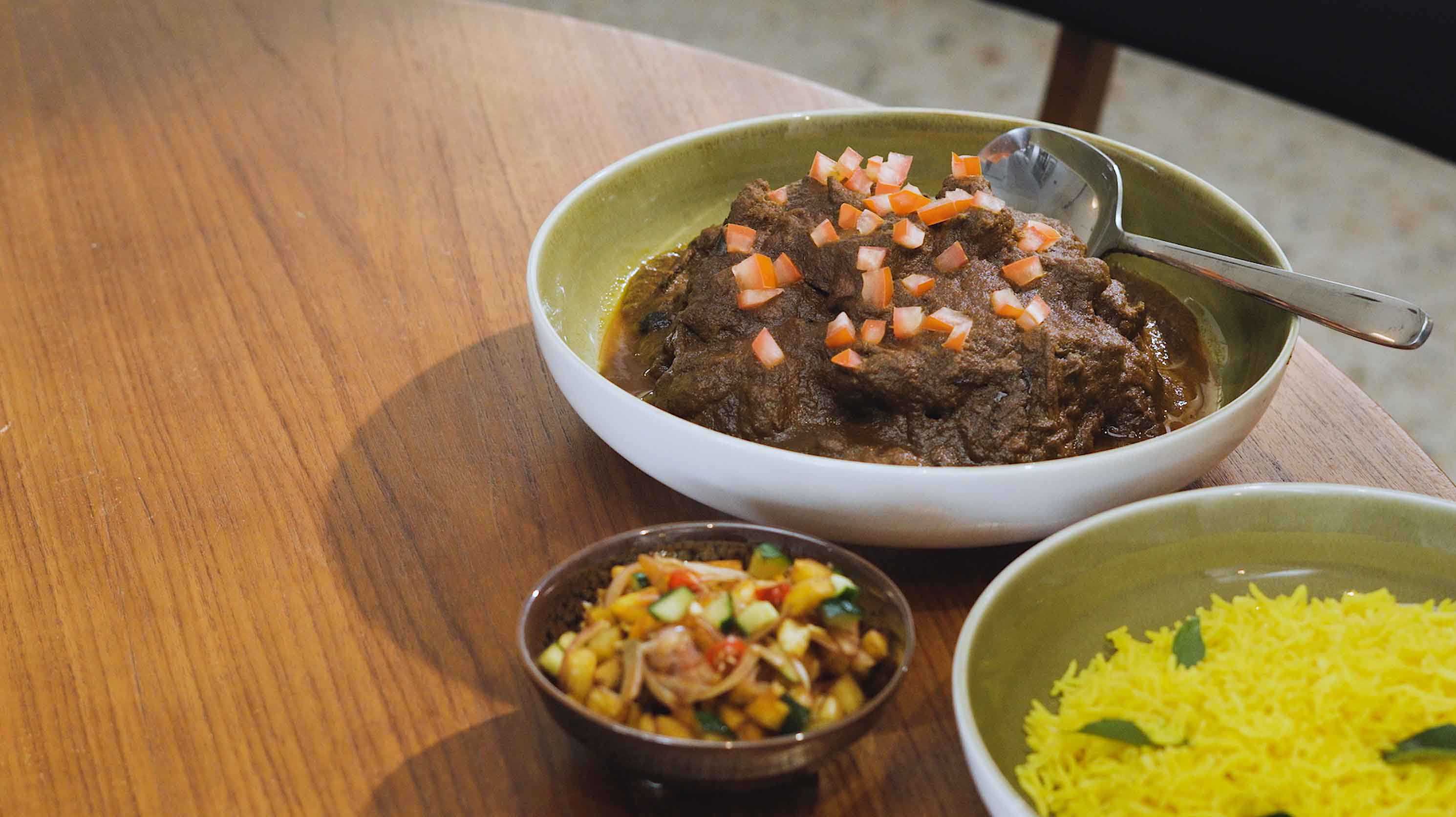
Chef Damian D’Silva Eurasian Beef Christmas Curry
- Prep time 1Hr
- Cook time 3Hr
- Technique Stew
- Meat Beef
- Cut Brisket
- Serves 10
Chef, restaurateur and heritage food personality, Damian D’Silva shares his recipe for a rich Eurasian stew that is slow-cooked to perfection and ideal for festive family celebrations.
Ingredients
- 1000g Beef Brisket Point End
- 1000g Beef Chuck
- 15g Cinnamon stick
- 2g Cloves
- 2pcs Star anise
- ½ Nut of whole nutmeg
- 6 Tbsp meat curry powder (add water until it forms a wet mixture)
- 2 Stalks of curry leaves
- 1 Stalk of daun salam (local bay leaves)
- 6 Skinned potatoes (halved)
- 3 Ripe tomatoes (quartered)
- Oil or ghee for cooking
- Salt to taste
For the coconut milk:
- 400g Fresh grated coconut
- 2 - 5 Cups of water
For the spice paste:
- 250g Peeled shallots
- 50g Skinned ginger
- 70g Peeled garlic
- 40g Dried chillies (wet weight)
- 20g Skinned fresh turmeric
- 30g Skinned galangal
- 3 Stalks of lemongrass stem (just the white stem, sliced fine)
- 20g Soaked candlenuts
Method
1. Cut your beef into 50mm cubes and dry with a kitchen towel.
2. Add 2 cups of warm water to 400g grated coconut and extract thick coconut milk. Add another 3 cups of water and extract again to get thin coconut milk. You may also use ready-squeezed coconut milk instead.
3. Add all the ingredients for the spice paste into a blender and blend until it forms a thick paste.
4. Add 10 tablespoons of cooking oil or ghee to a braising pot and set the flame to medium until it starts to bubble when a wooden spoon touches the oil.
5. Add the cinnamon sticks, cloves, star anise and nutmeg and fry for 1 minute then add the blended paste and cook for around 5 minutes, stirring continuously to prevent the paste from sticking.
6. Add the beef cubes and cook, stirring continuously to avoid sticking. If it does stick, add ½ cup of the extracted thin coconut milk.
7. After about 6 to 8 minutes, add the meat curry powder mixture, curry leaves and duan salam, stirring continuously, and cook for 3 minutes.
8. Now add the remainder of the extracted thin coconut milk, cover the pot, and bring to a boil, stirring occasionally.
9. After 10 minutes, add the tomatoes and cook for another 3 to 5 minutes.
10. To test that the beef is about half cooked, use a knife and gently pierce the meat - if it penetrates with a little resistance, then it is time to add the extracted thick coconut milk.
11. Add the potatoes, cover and continue to cook for a further 20 to 25 minutes stirring occasionally. Test the meat after 20 minutes again by using a knife, if it penetrates without any effort, it is perfectly cooked.
12. If the cooking extends beyond the 25-minute mark and the curry looks too dry, add a cup of water and continue to cook till the meat softens. However, make sure to check that your potatoes don't overcook. You can remove them first and put them in later (Tip: I would never recommend frying or boiling the potatoes first as they lack the flavour that the potatoes absorb when they're cooked with the curry).
13. When you're curry is almost done, remember to salt for flavour. The finished curry should not be dry or watery. It has to have a consistency of a rich stew that just needs aromatic rice as an accompaniment.

